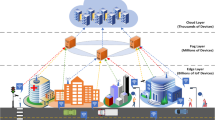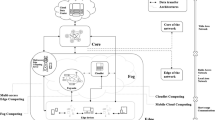Abstract
In this paper, we propose a hybrid fog and cloud-aware heuristic for the dynamic scheduling of multiple real-time Internet of Things (IoT) workflows in a three-tiered architecture. In contrast to traditional approaches where the main processing of IoT jobs is performed in the fog layer, our approach attempts to schedule computationally demanding tasks with low communication requirements in the cloud and communication intensive tasks with low computational demands in the fog, utilizing possible gaps in the schedule of the fog and cloud virtual machines. Furthermore, during the scheduling process, our approach takes into account the communication cost incurred by the transfer of data from the sensors and devices in the IoT layer to the fog layer. The performance of the proposed heuristic is evaluated and compared via simulation to a baseline cloud-unaware strategy, under different cases of workload. The simulation results reveal that the proposed scheduling heuristic provides on average 76.69% lower deadline miss ratio, compared to the baseline policy. However, this is achieved at a significant monetary cost, due to the usage of cloud resources.





Similar content being viewed by others
References
Arabnejad H, Barbosa JG (2014) List scheduling algorithm for heterogeneous systems by an optimistic cost table. IEEE Trans Parallel Distrib Syst 25(3):682–694. https://doi.org/10.1109/TPDS.2013.57
Bittencourt LF, Diaz-Montes J, Buyya R, Rana OF, Parashar M (2017) Mobility-aware application scheduling in fog computing. IEEE Cloud Comput 4(2):26–35. https://doi.org/10.1109/MCC.2017.27
Buttazzo GC (2011) Hard real-time computing systems: predictable scheduling algorithms and applications, 3rd edn. Springer, New York. https://doi.org/10.1007/978-1-4614-0676-1
Chen Y (2018) Service-oriented computing and system integration: software, IoT, big data, and AI as services, 6th edn. Kendall Hunt Publishing, Dubuque
Chen Y, Tsai WT (2015) Service-oriented computing and web software integration: from principles to development, 5th edn. Kendall Hunt Publishing, Dubuque
Cisco (2015) Fog computing and the Internet of Things: extend the cloud to where the things are. Tech. Rep. C11-734435-00, Cisco Systems, Inc
Dastjerdi AV, Buyya R (2016) Fog computing: helping the Internet of Things realize its potential. Computer 49(8):112–116. https://doi.org/10.1109/MC.2016.245
Deng R, Lu R, Lai C, Luan TH, Liang H (2016) Optimal workload allocation in fog-cloud computing toward balanced delay and power consumption. IEEE Internet Things J 3(6):1171–1181. https://doi.org/10.1109/JIOT.2016.2565516
Gia TN, Jiang M, Rahmani A, Westerlund T, Liljeberg P, Tenhunen H (2015) Fog computing in healthcare Internet of Things: a case study on ECG feature extraction. In: Proceedings of the 13th IEEE international conference on pervasive intelligence and computing (PICom’15), pp 356–363. https://doi.org/10.1109/CIT/IUCC/DASC/PICOM.2015.51
Hao Z, Novak E, Yi S, Li Q (2017) Challenges and software architecture for fog computing. IEEE Internet Comput 21(2):44–53. https://doi.org/10.1109/MIC.2017.26
Jararweh Y, Doulat A, AlQudah O, Ahmed E, Al-Ayyoub M, Benkhelifa E (2016) The future of mobile cloud computing: integrating cloudlets and mobile edge computing. In: Proceedings of the 23rd international conference on telecommunications (ICT’16), pp 1–5. https://doi.org/10.1109/ICT.2016.7500486
Jiang HJ, Huang KC, Chang HY, Gu DS, Shih PJ (2011) Scheduling concurrent workflows in HPC cloud through exploiting schedule gaps. In: Proceedings of the 11th international conference on algorithms and architectures for parallel processing (ICA3PP’11), pp 282–293. https://doi.org/10.1007/978-3-642-24650-0_24
Liu J, Li J, Zhang L, Dai F, Zhang Y, Meng X, Shen J (2018) Secure intelligent traffic light control using fog computing. Futur Gener Comput Syst 78(2):817–824. https://doi.org/10.1016/j.future.2017.02.017
Masip-Bruin X, Marín-Tordera E, Tashakor G, Jukan A, Ren G (2016) Foggy clouds and cloudy fogs: a real need for coordinated management of fog-to-cloud computing systems. IEEE Wirel Commun 23(5):120–128. https://doi.org/10.1109/MWC.2016.7721750
Nan Y, Li W, Bao W, Delicato FC, Pires PF, Zomaya AY (2016) Cost-effective processing for delay-sensitive applications in Cloud of Things systems. In: Proceedings of the IEEE 15th international symposium on network computing and applications (NCA’15), pp 162–169. https://doi.org/10.1109/NCA.2016.7778612
OpenFog (2016) OpenFog architecture overview. Tech. Rep. OPFWP001.0216, OpenFog consortium architecture working group
Pham XQ, Huh EN (2016) Towards task scheduling in a cloud-fog computing system. In: Proceedings of the 18th Asia-Pacific network operations and management symposium (APNOMS’16), pp 1–4. https://doi.org/10.1109/APNOMS.2016.7737240
Pham XQ, Man ND, Tri NDT, Thai NQ, Huh EN (2017) A cost- and performance-effective approach for task scheduling based on collaboration between cloud and fog computing. Int J Distrib Sens Netw 13(11):1–16. https://doi.org/10.1177/1550147717742073
Rahmani AM, Gia TN, Negash B, Anzanpour A, Azimi I, Jiang M, Liljeberg P (2018) Exploiting smart e-Health gateways at the edge of healthcare Internet-of-Things: a fog computing approach. Futur Gener Comput Syst 78(2):641–658. https://doi.org/10.1016/j.future.2017.02.014
Shah-Mansouri H, Wong VWS (2018) Hierarchical fog-cloud computing for IoT systems: a computation offloading game. IEEE Internet of Things 5(4):3246–3257. https://doi.org/10.1109/JIOT.2018.2838022
Stavrinides GL, Karatza HD (2014) Scheduling real-time jobs in distributed systems - simulation and performance analysis. In: Proceedings of the 1st international workshop on sustainable ultrascale computing systems (NESUS’14), pp 13–18
Stavrinides GL, Karatza HD (2017) The effect of workload computational demand variability on the performance of a SaaS cloud with a multi-tier SLA. In: Proceedings of the IEEE 5th international conference on future Internet of Things and cloud (FiCloud’17), pp 10–17. https://doi.org/10.1109/FiCloud.2017.26
Stavrinides GL, Karatza HD (2017) The impact of data locality on the performance of a SaaS cloud with real-time data-intensive applications. In: Proceedings of the 21st IEEE/ACM international symposium on distributed simulation and real time applications (DS-RT’17), pp 1–8. https://doi.org/10.1109/DISTRA.2017.8167683
Stavrinides GL, Karatza HD (2017) Simulation-based performance evaluation of an energy-aware heuristic for the scheduling of HPC applications in large-scale distributed systems. In: Proceedings of the 8th ACM/SPEC international conference on performance engineering (ICPE’17), 3rd international workshop on energy-aware simulation (ENERGY-SIM’17), pp 49–54. https://doi.org/10.1145/3053600.3053611
Stavrinides GL, Karatza HD (2018) Energy-aware scheduling of real-time workflow applications in clouds utilizing DVFS and approximate computations. In: Proceedings of the IEEE 6th international conference on future Internet of Things and cloud (FiCloud’18), pp 33–40. https://doi.org/10.1109/FiCloud.2018.00013
Stavrinides GL, Karatza HD (2018) The impact of workload variability on the energy efficiency of large-scale heterogeneous distributed systems. Simul Model Pract Theory 89:135–143. https://doi.org/10.1016/j.simpat.2018.09.013
Stavrinides GL, Karatza HD (2018) Scheduling data-intensive workloads in large-scale distributed systems: trends and challenges, Studies in big data, vol 36, chap 2, 1st edn. Springer, Cham, pp 19–43. https://doi.org/10.1007/978-3-319-73767-6_2
Taneja M, Davy A (2017) Resource aware placement of IoT application modules in fog-cloud computing paradigm. In: Proceedings of the 2017 IFIP/IEEE symposium on integrated network and service management (IM’17), pp 1222–1228. https://doi.org/10.23919/INM.2017.7987464
Topcuoglu H, Hariri S, Wu MY (2002) Performance-effective and low-complexity task scheduling for heterogeneous computing. IEEE Trans Parallel Distrib Syst 13 (3):260–274. https://doi.org/10.1109/71.993206
Wen Z, Yang R, Garraghan P, Lin T, Xu J, Rovatsos M (2017) Fog orchestration for Internet of Things services. IEEE Internet Comput 21(2):16–24. https://doi.org/10.1109/MIC.2017.36
Author information
Authors and Affiliations
Corresponding author
Additional information
Publisher’s note
Springer Nature remains neutral with regard to jurisdictional claims in published maps and institutional affiliations.
Rights and permissions
About this article
Cite this article
Stavrinides, G.L., Karatza, H.D. A hybrid approach to scheduling real-time IoT workflows in fog and cloud environments. Multimed Tools Appl 78, 24639–24655 (2019). https://doi.org/10.1007/s11042-018-7051-9
Received:
Revised:
Accepted:
Published:
Issue Date:
DOI: https://doi.org/10.1007/s11042-018-7051-9




